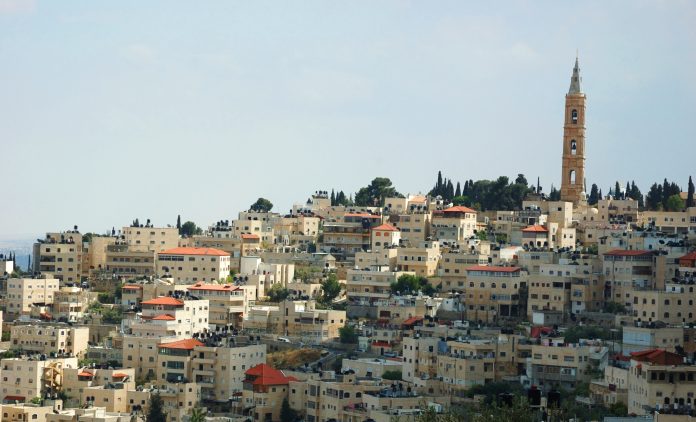
By James Marlow
The Greek Orthodox Church which owns a huge amount of land in the capital has sold 500 dunams of land in central Jerusalem to an anonymous group of investors, spurring fears of a hostile takeover.
It is believed that some 124 acres of land containing more than 1,000 housing units in numerous buildings have been sold, but it still remains unclear which homes will be affected.
For many years the land was leased to the Jewish National Fund in agreements that are about to expire, leaving the residents’ future rights in limbo.
Members of Knesset, Rachel Azaria and Akram Hasson of the Kulanu party, Yossi Yonah of Zionist Union, Mickey Levy of Yesh Atid and Uri Maklev of United Torah Judaism have been discussing the matter in Knesset meetings but no decisions were taken as it is believed there is nothing the state can do.
According to MK Azaria, residents who bought houses or apartments on the land were aware that it was leased by JNF, but were led to believe it would remain so for many years to come. She explained that “The land was leased by the church to the JNF in the 1950’s for 99 years.” But it’s not a matter of one building or a few families, but very large and prestigious neighbourhoods in the heart of Jerusalem.
She continued, “Buildings were constructed on it in which people have been living for decades and residents knew that the agreements would expire within a certain time. But they assumed that the lease to JNF would be extended for a further period.”
Azaria noted, however, that a few months ago the Jerusalemites Party, which holds two seats in the Jerusalem City Council, determined that private developers received a 200-year lease on some of the land in 2011, and that an additional investor group signed a similar agreement one year ago.
“Following this, the city council received a flood of inquiries from residents of the area who did not know what the future held for them,” she recounted.
Last week, a large gathering of the residents was held by the Jerusalemites Party and addressed by council member Itai Gutler and architect Yehuda Greenfield.
“The residents are demanding to know who among them is affected by the agreement between the church and the developers and who is not, what the agreements say, and what they mean for them.”
Hundreds of residents who assumed that the lease from the church would be extended never imagined that they would find themselves having to deal with private developers who will suddenly hold the land when the lease agreements expire.”
Azaria ominously added: “In such a situation, they are liable to find themselves with nothing.”
To avert a full-blown housing crisis, Azaria said she requested an early debate in the Knesset, in conjunction with a petition that the residents brought against the Jerusalem Municipality to obtain information that is currently being withheld.
“The second demand,” she said, “is that someone should take the matter in hand and conduct negotiations with the developers on behalf of the residents, rather than each apartment owner having to deal with the developers themselves. This is a major event concerning a substantial part of Jerusalem, and one that will affect its character.”
Noting that the unknown developers – in exchange for extending the lease – could ask for additional building rights and build on open areas, Azaria said the government must oversee all elements of the transfer to ensure the residents’ rights.
“It is important that the state should intervene on the matter,” she said.
“The value of the residents’ apartments is constantly falling, even in neighbourhoods like Rehavia. Anyone who buys an apartment in these areas now is taking a risk, and that affects the value of the properties.”
The Jerusalem Municipality said in a statement that it was actively working with all parties involved in the matter.
In a meeting with Minister of Justice Ayelet Shaked, Mayor Nir Barkat insisted he was dealing with this matter and prioritizing it to the highest level of importance.









